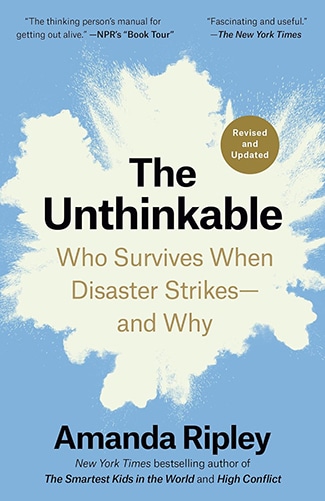You're on an airplane that crash lands. Smoke fills the cabin, and you've got only seconds to react. How would you respond? Would you immediately take action — or freeze in place? While you might think you know how a scene like this would play out from watching movies, the reality of what occurs in the aftermath of a disaster is quite a bit different. And that knowledge gap could prove deadly. My guest, Amanda Ripley, spent years researching how humans actually respond in emergencies, interviewing their survivors, as well leading researchers. In her book, The Unthinkable: Who Survives When Disaster Strikes—and Why, she uncovers the myths and realities of survival psychology and explores the individual and structural factors that shape people's outcomes in unexpected crises. Today, Amanda explains why the biggest threat during an emergency isn't panic but passivity — and how to overcome the tendency to be overly complacent and compliant. We discuss why you might actually want to read the airplane safety card, what we can learn from the surprising calm that prevailed in the World Trade Center towers on 9/11, how to improve your risk assessment, what influences if you'll act heroically in an emergency, and much more. This episode will give you plenty to think about — and could even make the difference in how you respond if you're ever faced with the unthinkable.
You're on an airplane that crash lands. Smoke fills the cabin, and you've got only seconds to react. How would you respond? Would you immediately take action — or freeze in place?
While you might think you know how a scene like this would play out from watching movies, the reality of what occurs in the aftermath of a disaster is quite a bit different. And that knowledge gap could prove deadly.
My guest, Amanda Ripley, spent years researching how humans actually respond in emergencies, interviewing their survivors, as well leading researchers. In her book, The Unthinkable: Who Survives When Disaster Strikes—and Why, she uncovers the myths and realities of survival psychology and explores the individual and structural factors that shape people's outcomes in unexpected crises. Today, Amanda explains why the biggest threat during an emergency isn't panic but passivity — and how to overcome the tendency to be overly complacent and compliant. We discuss why you might actually want to read the airplane safety card, what we can learn from the surprising calm that prevailed in the World Trade Center towers on 9/11, how to improve your risk assessment, what influences if you'll act heroically in an emergency, and much more. This episode will give you plenty to think about — and could even make the difference in how you respond if you're ever faced with the unthinkable.
